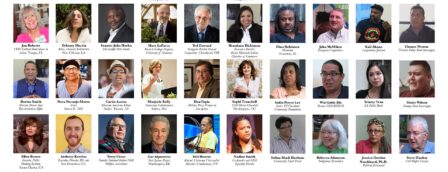
I have been wondering why there are not more universities doing Farm to College Programs especially given their successful impact on students’ dining and statewide farmers and growers. Mark LoParco, University of Montana Director of Dining and Former President of the National Association of College & University Food Services (NACUFS), implemented such a program way back in 2003 and has shown it to be successful by any measure—students’ nutrition, farmers’ livelihoods and financial cost. As a long-time advocate and activist for a sustainable, just and caring society, I traveled the country to video interview innovators on the cutting edge in arts, education, economy and communities. I found Mark in Missoula having fun with food for students while changing the lives of Montana farmers and growers.
Mark was introduced to the Slow Food Movement while traveling in Italy where he experienced not only the delicious local food but the interconnection of the producers and consumers creating a community. His enthusiasm for farm to college programs is also based on a moral compass for doing the right thing. He is concerned with the growing reliance on agribusiness with 10 companies controlling the world’s food. http://huff.to/2ctKMSF Although, Mark believes there is a need for responsible agribusiness, there is also a need to maintain and support a strong, vibrant local food system.
The Farm to College Program at the University of Montana changed the lives and the way growers do business in the state. Western Montana Growers Cooperative came into being to meet the university’s large scale demand and to coordinate distribution and delivery of its products. Instead of buying from 30 to 40 farmers and growers, the university can now go to one source. The university’s program now purchases over 20% local agricultural products spending over $800,000 within the state with plans to increase that. Mark states in the video interview that:” Everyone said the program would cost too much, which is an easy excuse not to do it. For the 11 years the program has been in effect, our budget has been at or below industry standards.”
Weekly Omelet Days on campus with Mark as World Famous Omelet Guy offers not only great tasting omelets but fun for the students. He integrates the event into local happenings on campus such as dressing in bustier and fishnet stockings to advertise the School of Theatre & Dance production of “Rocky Horror Picture Show.”
Since my visit with Mark, the University of Montana Dining Service won a Gold award in the NACUFS Sustainability Awards Program in the category of Education and Outreach and also won the Grand Prize which is awarded to one of the Gold award winners from all five sustainability award categories.
Many of us participate in some way in the local food movement by buying directly or indirectly from smaller, sustainable farms. Naturally, our purchases do benefit ourselves as well as the livelihoods of local producers. Universities, however, can have a larger scale impact as demonstrated by the effect of UM’s Farm to College Program on the state farmers and growers. Here are three actions you can take to grow your local food industry:
- Invite university students, faculty and/or administrators to watch and discuss video interview with Mark http://bit.ly/2cev1hM
- Read “Bringing Local Food to Local Institutions: A Resource Guide for Farms and Institutions.” http://bit.ly/2c9JkFw
- Invite Mark LoParco to speak on your campus. [email protected] (406) 243-5134
Jan Roberts –Social Change Agent-Creator of Sustainability Programs –Videographer Founder & President Cultural Innovations Agency; Founder Emerita Earth Charter US; Former Adjunct Professor, College of Business at University of Tampa & Author Operation Road Trip: How a Video Camera, a Bottle of Rum and a Car Renewed My Faith in the Future. http://amzn.to/2bDQH4P @opbonappetit https://undauntedchangemakers.org/
Enjoy one of Mark’s favorite dishes:[ultimate-recipe id=”7064″ template=”default”]
